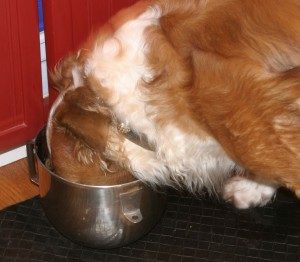I’ve been worried recently about the number of people who don’t know that the artificial sweetener xylitol is extremely toxic to dogs and that it is being used in more and more products.

This is Andy licking the bowl after I made cookies. (I do sterilize the bowl afterwards.) He and Lily come and wait in the kitchen as soon as they hear me getting the mixer out. They don’t really get much sugar in the licking, but they get tons of enjoyment! However, if I had used xylitol in the dough, they would be in danger of having seizures and even liver failure.
What if your dog eats a few pieces of sugar-free gum, or the remnants of a sugar-free pudding cup, or a muffin your neighbor baked using a sugar substitute.
Cause for alarm? Yes, if the sweetener used in the products was xylitol, widely substituted for sugar because it is cheap, sweet, low on the glycemic index, and has oral health benefits.
How dangerous could a few pieces of sugar-free gum containing xylitol be?
It depends on the amount of xylitol in the gum and the size of the dog. A typical stick of gum contains 300 to 400 milligrams of xylitol. The amount that will cause a dangerous drop in the dog’s blood sugar is considered to be approximately 450 milligrams per pound of the dog’s weight. The amount that may cause liver failure is 500 milligrams per pound.

A pack of gum could contain enough xylitol to kill two average size Golden Retrievers. A stick and a half could kill a Papillon.
Xylitol is safe for humans because we metabolize it slowly, with no ill effects, but dogs metabolize it within 30 minutes. The pancreas responds to it as if it were sugar, and releases insulin, which causes dangerously low blood sugar, or hypoglycemia.
What are the clinical signs of hypoglycemia?
Vomiting/Diarrhea, Weakness, Uncoordinated Movements, Depression, Seizures.
Most dogs will show clinical signs between 30 minutes and 12 hours after ingestion. Dogs who have ingested large amounts of xylitol and have shown no immediate signs of hypoglycemia, are still at risk for liver failure. The clinical signs of liver failure include jaundice, bleeding easily, swollen abdomen, mental confusion, sleepiness, coma.
What should you do if your dog eats something that may contain xylitol?
First, don’t panic. Read the labels carefully. Not all artificial sweeteners are dangerous, even other sweeteners that end in ‘–ol’.
Do not give the dog anything to eat or drink or attempt to treat him at home.

Take him to the vet who will do bloodwork and then give appropriate dextrose and iv fluids. The dog may also receive medicine to support his liver.
How will you know whether a product contains xylitol?
Read the label. Xylitol also comes under the names Eutrit, Kannit, Newtol, Xylite, Torch, or Xyliton.
It is also in products that are not labeled “sugar-free.” Because of its oral health benefits, it is in many toothpastes, mouthwashes, and chewing gums.
There are even mouthwashes targeted for pets that contain xylitol. (Really!) Aquadent is one. They are designed to be used in weight dependent amounts in water, but the danger is that a smaller dog could drink water intended for a larger dog, or a dog might get hold of the bottle itself.
Even human medicines prescribed by your vet may not be safe if the formula has been changed to include xylitol. Be careful and ask the pharmacist or the vet whether it does. For example, Dr. Patty Khuly reported that some commercially prepared versions of liquid gabapentin that used to be safe now have xylitol in them. http://www.petmd.com/blogs/thedailyvet/2011/February?page=5

What can we do?
Tell everyone we know about the dangers of xylitol, whether they have dogs or not.
Have nothing containing xylitol in the house. (My husband keeps his gum in his car.)
Educate your family and friends who are diabetic or dieting that products with artificial sweeteners can be deadly to your dog.
Lobby to have products that contain substances that are toxic to animals be labelled so consumers will know.
Note: I am not a veterinarian, but have tried to collect pertinent, reliable information about xylitol for the layperson.
Here is a list of websites if you would like to know more.
http://www.petpoisonhelpline.com/?s=xylitol&x=0&y=0
http://www.merrickvet.com/70723/6303.html
http://www.pethealthnetwork.com/dog-health/dog-toxins-poisons/xylitol-poisoning-dogs-a-deadly-sugar-substitute
http://veterinarypartner.com/Content.plx?A=2859
Or google xylitol toxicity in dogs.




